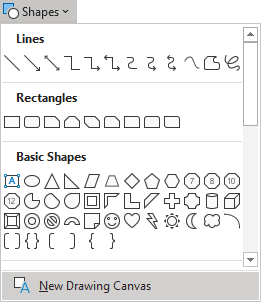
A flowchart or flow chart usually shows steps of the task, process, or workflow. Word for Microsoft 365 provides many predefined SmartArt templates that you can use to make a flowchart, including visually appealing basic flowchart templates with pictures. However, if you have a process with a tangled flow or you need a custom layout, you can build a complex flowchart in Word using rectangular, diamond, round, and other box types.

Managers, system analysts, programmers, and engineers adopted flowcharts as a mean of communication for describing:
No wonder that building blocks and rules of flow charts were standardized by the American National Standards Institute (ANSI) and International Organization for Standards (ISO) more than 50 years ago. The current standard defines the drawing direction from top to bottom and left to right and specific symbols for different types of entities, actions, etc. E.g.:
 Flowchart terminator in Word 365" width="160" height="42" /> Flowchart terminator in Word 365" width="160" height="42" /> | Rectangle with round corners marks for starting and terminating states |
 | Box with straight corners represents the process stages |
 | Parallelogram illustrates data input/output |
 | Diamond marks conditional branching |
| Arrow shows the process flow |
You can find all these shapes and other useful visual elements in the Shapes dropdown list on the Insert tab of Microsoft Word.
The flowchart above is "cross-functional" and defines the responsibility zones of different business units.
To create a diagram like the one above, follow the next steps (we recommend to check the tip how to easily organize shapes in Word, which demonstrates easy tricks to simplify the drawing routine):
The drawing canvas is an essential element for the flow chart that you need to add before adding the flow shapes because of flowchart connectors. You can add flowcharts connectors only between the shapes within the drawing canvas:
1. On the Insert tab, in the Illustrations group, click Shapes:

2. On the Shapes list, in the bottom, choose New Drawing Canvas:

Word adds the new drawing canvas to your flow chart:

3. On the Shapes list, in the Flowchart group, select the block you want to add:

4. To add text to the selected shape, just double-click in it and enter the text.
5. To connect shapes, do the following:


Top-to-down flowcharts are perfect for the Portrait page orientation in Microsoft word. For the Landscape page orientation or the PowerPoint presentation, the preferred layout is left-to-right. Sometimes left-to-right flow diagrams with delimited borders of organization unit activities are called Swimlane diagrams or Swimlane flowcharts.
Today, 30% of our visitors use Ad-Block to block ads.We understand your pain with ads, but without ads, we won't be able to provide you with free content soon. If you need our content for work or study, please support our efforts and disable AdBlock for our site. As you will see, we have a lot of helpful information to share.

A flowchart or flow chart usually shows steps of the task, process, or workflow. Word for Microsoft 365 provides many predefined SmartArt templates that you can use to make a flowchart, including visually appealing basic flowchart templates with pictures. However, if you have a process with a tangled flow or you need a custom layout, you can build a complex flowchart in Word using rectangular, diamond, round, and other box types.

A flowchart or flow chart usually shows steps of the task, process, or workflow. Microsoft Word provides many predefined SmartArt templates that you can use to make a flowchart, including visually appealing basic flowchart templates with pictures. However, if you have a process with a tangled flow or you need a custom layout, you can build a complex flowchart in Word using rectangular, diamond, round, and other box types.

Microsoft Word (like Microsoft Excel and Microsoft PowerPoint) proposes tools to create and update organizational charts, but only for the hierarchical organizations. A hierarchical organization is a tree-like organizational structure where every entity in the organization, except the root, is subordinate to a single other node, i.e., has only one parent.